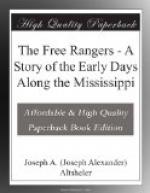“But not without our deer, I hope,” said Paul. They gave one last look at the far edge of the prairie, where they could still dimly see the white stallion, now keeping well away from the woods.
“I don’t think anything will get him,” said Henry, “and I hope not. Just as we do, he loves to be free.”
They, too, re-entered the woods and were fortunate enough to find a deer quickly. Henry was willing to risk the chance of the shot being heard by their enemies and his bullet brought it down. Then they cut up the body and took it back to the boat, where they told all that had occurred. The others agreed that if Alvarez and his men were in the vicinity they ought to leave at once, and, transferring the drying clothes from the bank to the boat, they entered the Mississippi once more and set sail down its stream.
CHAPTER XIV
NEW ORLEANS
They sailed and rowed steadily on for several days. Once or twice they saw canoes or boats containing white men, who regarded them curiously, but none approached. They inferred that they were now very near New Orleans, and all the five were alert with anticipation. Besides the accomplishment of their great task, they were about to visit a metropolis, a seat of government, a city of eight or ten thousand people, commanding the road to the heart of the North American continent, swarming with many races, and destined, as all the world then believed, to be the largest place in either America. It is no wonder that the bosoms of the five throbbed with curiosity, and that they looked forward to strange and varied sights.
“Now, Jim,” said Shif’less Sol in a warning tone to Long Jim, “I’ve got advice to give you. I wuz in a big town once. I told you about that time I went to Baltimore when I wuz a little boy, an’ so I’m fit to tell you how to behave. New Or-lee-yuns ain’t like the woods, Jim. Don’t you be too handy with your gun. Ef you see a man follerin’ along behind you ez ef he wuz trailin’ you, don’t you up an’ take a shot at him. Like ez not he’s about his business, only it happens to be in the same direction that you’re goin’. An’, Jim, don’t you go to gittin’ dizzy, through seein’ so many people about. Mebbe you don’t think thar will be sech a crowd, but you’ll believe it when you see it.”
“Sol Hyde,” rejoined Long Jim indignantly, “I’m sorry New Or-lee-yuns ain’t right at the sea, ‘cause the sea is salt, so I’ve heard, an’ then ef I wuz to dip you in it three or four times it would do you a pow’ful lot uv good. Salt is shorely mighty helpful in the curin’ up uv fresh things.”
“There goes another of those canoes,” said Paul, “but I can’t tell whether it’s a white man or an Indian in it.”
“It’s a white man,” said Henry, “but I fancy it’s a West Indian Frenchman or Spaniard. I’ve heard that some of them are as dark as Indians.”
“Time to think ‘bout tyin’ up for the dark,” said Tom Ross. “We might go on all night, but we need to save our strength fur to-morrow. What do you say to that little cove over thar on the west bank, Henry?”




